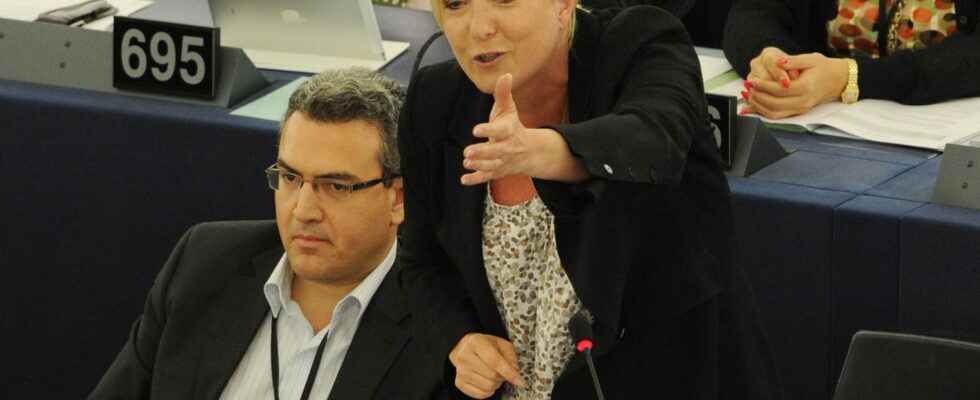EU EXIT. Leaving the EU is no longer on Marine Le Pen’s program for the 2022 presidential election. But several measures, including the “Europe of Nations” and the revision of certain treaties, could lead to sanctions by the European Union against France or even a “Frexit”…
[Mis à jour le 20 avril 2022 à 21h55] The exit from the European Union and the end of the euro, an old refrain of the National Front, had been the subject of hesitation during the last presidential election, Marine Le Pen having backtracked on her referendum on the “Frexit” in between the two rounds of his campaign, so as not to frighten the voters. For this presidential 2022, the formal divorce with the EU is clearly no longer part of the program of the candidate of the RN. A clarification which is not without raising questions, several observers having underlined during the campaign that certain measures would lead, in fact, to a rupture.
During the debate between the two rounds of the 2022 presidential election, this Wednesday, April 20, the question of the EU was addressed from the outset, Marine Le Pen affirming her desire to leave the European market for energy, to protect the purchasing power of the French. It gave rise to a moment of tension when Emmanuel Macron accused Marine Le Pen of not having a coherent project on staying in the EU, with his concept of “Europe of nations” and national preference. So where is the RN candidate on leaving the EU?
What Marine Le Pen says: in her program, the RN candidate says she wants to form “a European Alliance of Nations which aims to gradually replace the European Union”, but does not deliver a concrete operating mode to achieve this or a method to negotiate it with our current European partners. One of the concrete elements of the program, on the other hand, is a referendum aimed at modifying the constitution with a view, among other measures, to making French law prevail over European law. The text is even already presented in extenso on the candidate’s websitein a booklet devoted to immigration.
This referendum bill called “Citizenship, identity and immigration” regrets in particular, in the explanatory memorandum, that “in France, immigration is governed mainly by the European Convention for the Protection of Human Rights and Freedoms and by the case law of the Constitutional Council, the Council of State, the Court of Justice of the European Union and the European Court of Human Rights”. “This situation stems from the fact that the Constitution is silent on the question of the status of foreigners, with the exception of the right of asylum enshrined in the preamble of 1946. It also stems from the primacy of European law over French law”, is it explained. It is thus considered “essential to modify the Constitution to include provisions relating to the status of foreigners and nationality and to make national law prevail over international law”.
A referendum synonymous with “Frexit”?
The referendum is, in practice, supposed to allow the establishment of several key measures of Marine Le Pen’s program, impossible without reform of the constitution: the end of jus soli, the possibility of prohibiting or limiting by law family reunification or the conditions for submitting asylum applications. It must also pave the way for the national priority “for employment and housing” or even the famous “principle of superiority of the Constitution over any other standard, even international”.
What there is to know : several documented press articles calling on specialists in international and constitutional law (such as the one published in April by The Decoders of the World) questioned the feasibility of this project. Change of the constitution or not, the principle of superiority of French laws over European laws, in particular, can only go through a renegotiation of the European treaties, which supposes a unanimous agreement of the 26 other Member States of the EU. Failing to obtain this highly improbable agreement, France can only unilaterally free itself from European law, thus exposing itself to legal action by the EU and therefore to significant financial sanctions.
The same applies to the control of people at the borders (requiring a renegotiation of the Schengen agreements) or the reduction of our contribution to the European budget (renegotiation of the multi-year financing plan). As for the principle of national priority, in other words to reserve certain allowances, certain jobs and accommodation for the French, this will only be possible by leaving the European Convention for the Protection of Human Rights and Fundamental Freedoms (ECHR) or, as the RN proposes, to no longer take his opinions into account. A choice that would also inevitably isolate the country.
